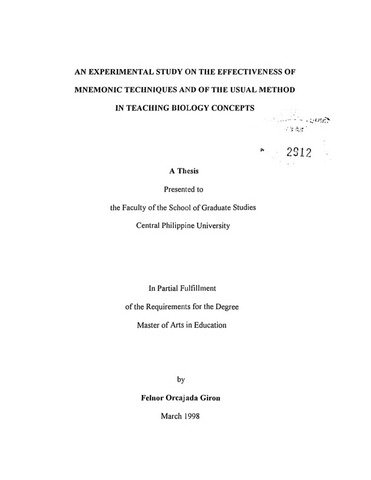An experimental study on the effectiveness of mnemonic techniques and of the usual method in teaching biology concepts

Page views
2,503Petsa
1998May-akda
Tagapangulo ng Panel ng Depensa
Magbahagi
Metadata
Ipakita ang buong tala ng item
Abstract
This study determined the relative effectivity of Acrostics and Ridiculous Association, two mnemonic techniques to impose meaningful structures on Biology concepts, over that of the usual method, controlling the variables of age, sex, IQ, family income, and general average. The experimental design was used, specifically the pre-test and post test control group design using two equated groups from second year sections C and D of the Central Philippine University (CPU) Development High School, frequency-matched during the school year 1996-1997.
The objectives of the study were to determine which technique would result in better retention in terms of higher test scores in immediate recall and in delayed recall; and which technique would prove more effective with subjects in different groups classified according to age, sex, IQ, family income, and general average.
Four pairs of booklets were prepared. One pair was on the first five animal phyla in two versions. One version used the usual textual presentation, and the other used Acrostics; this given at the first session Another pair of booklets discussed the last five animal phyla not included in the first booklets, also in two versions—the usual text and the version using Ridiculous Association; this was used at the second class session.
The third pair of booklets contained the plantlike protists and monerans, again, in two versions—using the usual textual presentation and Acrostics. The fourth pair of booklets discussed the two major groups of plants—Tracheophyta and Atracheophyta, also in two versions: the usual text and the version using Ridiculous Association.
Two sets of tests were prepared—one to serve as pre-test and the other as post test, congruent in subject matter, were to measure immediate recall. A 120-item test was prepared likewise and given as final test a week after the last treatment, and another 120- item test given two months after, to test delayed recall.
The t-test was applied to determine the differences between the pre-test and post test results as well as the difference between the control and the experimental groups.
Results showed significant effect on students’ immediate recall, of Acrostics, over the usual method of teaching Biology concepts, specifically Taxonomy, at .05 level or 95% level of confidence. Moreover, the two mnemonic techniques, Acrostics and Ridiculous Association, were found effective in aiding the students' delayed recall of the lessons in Taxonomy as compared to the usual textual version.
Sub analyses corroborated with the foregoing results, showing that the mnemonic techniques were more effective than the usual method of teaching Biology on the students' delayed recall; the Acrostics on immediate recall. The higher IQ group moreover, performed better than the lower I.Q. group on both immediate and delayed recall, while no significant difference in performance was found among subjects classified according to age, sex, family income, and general average.
Paglalarawan
Abstract only
Associated Content
Journal article published in Southeast Asia JournalMungkahing Sipi
Giron, F. O. (1998). An experimental study on the effectiveness of mnemonic techniques and of the usual method in teaching biology concepts (Unpublished Master's thesis). Central Philippine University, Jaro, Iloilo City.
Uri
ThesisMga Paksa
Mga keyword
Kagawaran
School of Graduate StudiesDegree
Master of Arts in Education major in Educational Administration and SupervisionLokasyon ng Istante
GSL Theses 378.242 G444
Pisikal na paglalarawan
xiv, 159 leaves

